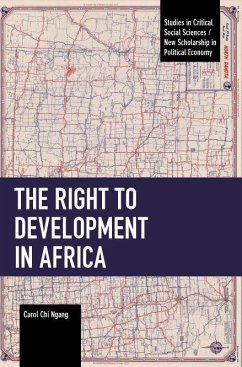Carol Chi Ngang
The Right to Development in Africa
42,99 €
inkl. MwSt.
Versandkostenfrei*
Liefertermin unbestimmt
Melden Sie sich
hier
hier
für den Produktalarm an, um über die Verfügbarkeit des Produkts informiert zu werden.

21 °P sammeln
Carol Chi Ngang
The Right to Development in Africa
- Broschiertes Buch
An important intervention into the thinking around development and dependency in Africa.
Andere Kunden interessierten sich auch für
![Fighting Corruption Is Dangerous: The Story Behind the Headlines Fighting Corruption Is Dangerous: The Story Behind the Headlines]() Ngozi Okonjo-IwealaFighting Corruption Is Dangerous: The Story Behind the Headlines28,99 €
Ngozi Okonjo-IwealaFighting Corruption Is Dangerous: The Story Behind the Headlines28,99 €![Farewell to Work? Farewell to Work?]() Ricardo AntunesFarewell to Work?29,99 €
Ricardo AntunesFarewell to Work?29,99 €![Service Workers in the Era of Monopoly Capital Service Workers in the Era of Monopoly Capital]() Fabian van OnzenService Workers in the Era of Monopoly Capital35,99 €
Fabian van OnzenService Workers in the Era of Monopoly Capital35,99 €![The Dialectical Meaning of Offshored Work The Dialectical Meaning of Offshored Work]() Miosz MiszczyskiThe Dialectical Meaning of Offshored Work30,99 €
Miosz MiszczyskiThe Dialectical Meaning of Offshored Work30,99 €![Forces of Production, Climate Change and Canadian Fossil Capitalism Forces of Production, Climate Change and Canadian Fossil Capitalism]() Nicolas GrahamForces of Production, Climate Change and Canadian Fossil Capitalism35,99 €
Nicolas GrahamForces of Production, Climate Change and Canadian Fossil Capitalism35,99 €![Growth and Change in Neoliberal Capitalism Growth and Change in Neoliberal Capitalism]() Alfredo Saad-FilhoGrowth and Change in Neoliberal Capitalism49,99 €
Alfredo Saad-FilhoGrowth and Change in Neoliberal Capitalism49,99 €![Uneven Landscapes of Violence Uneven Landscapes of Violence]() Hepzibah Munoz MartinezUneven Landscapes of Violence31,99 €
Hepzibah Munoz MartinezUneven Landscapes of Violence31,99 €-
-
-
An important intervention into the thinking around development and dependency in Africa.
Hinweis: Dieser Artikel kann nur an eine deutsche Lieferadresse ausgeliefert werden.
Hinweis: Dieser Artikel kann nur an eine deutsche Lieferadresse ausgeliefert werden.
Produktdetails
- Produktdetails
- Studies in Critical Social Science
- Verlag: Haymarket Books
- Seitenzahl: 415
- Erscheinungstermin: 25. Oktober 2022
- Englisch
- Abmessung: 226mm x 149mm x 26mm
- Gewicht: 612g
- ISBN-13: 9781642597998
- ISBN-10: 1642597996
- Artikelnr.: 63402305
- Herstellerkennzeichnung
- Libri GmbH
- Europaallee 1
- 36244 Bad Hersfeld
- gpsr@libri.de
- Studies in Critical Social Science
- Verlag: Haymarket Books
- Seitenzahl: 415
- Erscheinungstermin: 25. Oktober 2022
- Englisch
- Abmessung: 226mm x 149mm x 26mm
- Gewicht: 612g
- ISBN-13: 9781642597998
- ISBN-10: 1642597996
- Artikelnr.: 63402305
- Herstellerkennzeichnung
- Libri GmbH
- Europaallee 1
- 36244 Bad Hersfeld
- gpsr@libri.de
Carol Chi Ngang is Research Associate at the Free State Centre for Human Rights, University of the Free State, South Africa. He has published three edited volumes and a broad range of book chapters and journal articles.
Preface
Acknowledgments
Acronyms and Abbreviations
1 Introduction – Africa’s Development Setbacks in Context
1 Overview
2 Background
2.1 A Wrongly Conceived Development Trajectory
2.2 Starting Point
3 Approach and Structure
3.1 Theory Base
3.2 Scope and Delineation
3.3 Significance of the Book
3.4 Outline of Chapters
2 Historical Account on the Right to Development
1 Introduction
2 Origins of the Right to Development
2.1 Africa’s History of Development Injustices
2.1.1 Slavery and the Impact on Development in Africa
2.1.2 Iniquities of Colonialism
2.2 Decolonial Revolution
2.2.1 The Quest for Independence
2.2.2 Post-independence Difficulties
3 Evolution of the Right to Development
3.1 Latent Manifestations
3.1.1 Self-Determination
3.1.2 Third World Aspirations for Global Balance
3.2 Formal Recognition
3.2.1 Proclamations on the Right to Development
3.2.2 Legal Recognition and Protection
4 Conceptual Clarity
4.1 Nature of the Right to Development as a Human Rights Concept
4.1.1 Defining Characteristics
4.1.2 Substantive Entitlements
4.1.3 Legal Entitlements
4.1.4 Normative Standards
4.2 Nature of the Right to Development as a Development Paradigm
4.2.1 Specific Components for Realisation
4.2.2 Right to Development Goals
5 Concluding Remarks
3 Global Dynamics and the Geopolitics of Development Cooperation
1 Introduction
2 Cooperation Framework for Development
2.1 Origins of Development Cooperation
2.1.1 Brief Historical Account
2.1.2 Definitional Problem
2.2 Basic Features of Development Cooperation
2.2.1 Motives behind Development Cooperation
2.2.2 Operational Modalities
2.2.3 Patronage and Paternalism
2.3 Cooperation Patterns
2.3.1 North-South Cooperation
2.3.2 South-South Cooperation
2.3.3 Multilateralism and Global Partnership
3 Development Cooperation and the Right to Development
3.1 Determining the Connection
3.2 Political Nature and the Indeterminate Motives of Cooperation
3.2.1 Self-Interest
3.2.2 Desire to Dominate
3.3 Hurdles to Africa’s Development Prospects
3.3.1 Economic Sabotage
3.3.2 Military Disruptions
4 Asserting the Right to Development in Africa
4.1 Modalities for Realisation
4.1.1 Individual State Responsibility
4.1.2 Shared Responsibility for Concerted Action
4.2 Human Rights and Development Practice
4.2.1 The Law on Human Rights and Development in Africa
4.2.2 Normative Requirements for Cooperation
4.2.3 Continental Framework Mechanisms for implementation
5 Concluding Remarks
4 A Dispensation for Socio-Economic and Cultural Self-Determination
1 Introduction
2 Framework for Implementation
2.1 Right to Development Dispensation
2.1.1 Soft Law Provisions on the Right to Development
2.1.2 African Treaty Provisions on the Right to Development
2.1.3 Constitutional Guarantees
2.2 Entitlement to Self-Determination
2.2.1 The Rule of Law
2.2.2 Associated Legal Responsibilities
3 Safeguard Measures
3.1 The Duty to Protect
3.2 Enforcement Mechanisms
3.2.1 African Commission on Human and Peoples’ Rights
3.2.2 African Court on Human and Peoples’ Rights
3.2.3 Domestic Courts of First Instance
3.2.4 National Human Rights Institutions
3.3 Access to Justice and Means of Redress
3.3.1 Procedural Considerations
3.3.2 Litigation
3.3.3 Nature of Remedies
3.4 Critique of the Regime of Protection
3.4.1 Extraterritoriality and the Constraints of International Law
3.4.2 Inadequacies within the African Human Rights System
4 Concluding Remarks
5 Right to Development Governance for Africa
1 Introduction
2 Incongruities and the Complex Dynamics in Africa
3 Right to Development Regulatory Mechanisms
3.1. Mandated Entities for Development Policy Making
3.1.1 African Union (au)
3.1.2 States Governments – Selected Country Analysis
3.2 Implication for Ineffective Implementation
3.3 On the Decoloniality of Thought in Development Programming
3.3.1 Insufficiency in Development Cooperation Approaches
3.3.2 Some Major Impediments
3.3.3 The Obligation to Fulfil
3.3.4 The Right to Development as a Tool for Policy Making
4 Right to Development Governance
4.1 Conceptual Formulation
4.1.1 Definition and Justification for the Model
4.1.2 Functional Requirements
4.1.3 Capacity to Fulfil
4.2 Operational Considerations
4.2.1 Collective Socio-economic and Cultural Freedoms
4.2.2 Non-regression in the Enjoyment of Existing Rights
4.3 Relevance of the Right to Development Governance to Africa
5 Concluding Remarks
6 Conclusion – Right to Development Imperatives for Africa
1 Concluding Highlights
1.1 Summary Observations
1.2 Alternative Perspective to Development Thinking
2 Imperative for Political Action
2.1 African Union (au)
2.1.1 Africa’s Common Policy Principle
2.1.2 Financing for Development
2.1.3 On Skills and Technology Transfer
2.1.4 On Attaining the Superior Purpose for Development
2.2 States Governments
2.2.1 Socio-economic and Cultural Transformation
2.2.2 Transformative Leadership
2.2.3 Basis for Making Political Choices
3 Final Remarks
Bibliography
Index
Acknowledgments
Acronyms and Abbreviations
1 Introduction – Africa’s Development Setbacks in Context
1 Overview
2 Background
2.1 A Wrongly Conceived Development Trajectory
2.2 Starting Point
3 Approach and Structure
3.1 Theory Base
3.2 Scope and Delineation
3.3 Significance of the Book
3.4 Outline of Chapters
2 Historical Account on the Right to Development
1 Introduction
2 Origins of the Right to Development
2.1 Africa’s History of Development Injustices
2.1.1 Slavery and the Impact on Development in Africa
2.1.2 Iniquities of Colonialism
2.2 Decolonial Revolution
2.2.1 The Quest for Independence
2.2.2 Post-independence Difficulties
3 Evolution of the Right to Development
3.1 Latent Manifestations
3.1.1 Self-Determination
3.1.2 Third World Aspirations for Global Balance
3.2 Formal Recognition
3.2.1 Proclamations on the Right to Development
3.2.2 Legal Recognition and Protection
4 Conceptual Clarity
4.1 Nature of the Right to Development as a Human Rights Concept
4.1.1 Defining Characteristics
4.1.2 Substantive Entitlements
4.1.3 Legal Entitlements
4.1.4 Normative Standards
4.2 Nature of the Right to Development as a Development Paradigm
4.2.1 Specific Components for Realisation
4.2.2 Right to Development Goals
5 Concluding Remarks
3 Global Dynamics and the Geopolitics of Development Cooperation
1 Introduction
2 Cooperation Framework for Development
2.1 Origins of Development Cooperation
2.1.1 Brief Historical Account
2.1.2 Definitional Problem
2.2 Basic Features of Development Cooperation
2.2.1 Motives behind Development Cooperation
2.2.2 Operational Modalities
2.2.3 Patronage and Paternalism
2.3 Cooperation Patterns
2.3.1 North-South Cooperation
2.3.2 South-South Cooperation
2.3.3 Multilateralism and Global Partnership
3 Development Cooperation and the Right to Development
3.1 Determining the Connection
3.2 Political Nature and the Indeterminate Motives of Cooperation
3.2.1 Self-Interest
3.2.2 Desire to Dominate
3.3 Hurdles to Africa’s Development Prospects
3.3.1 Economic Sabotage
3.3.2 Military Disruptions
4 Asserting the Right to Development in Africa
4.1 Modalities for Realisation
4.1.1 Individual State Responsibility
4.1.2 Shared Responsibility for Concerted Action
4.2 Human Rights and Development Practice
4.2.1 The Law on Human Rights and Development in Africa
4.2.2 Normative Requirements for Cooperation
4.2.3 Continental Framework Mechanisms for implementation
5 Concluding Remarks
4 A Dispensation for Socio-Economic and Cultural Self-Determination
1 Introduction
2 Framework for Implementation
2.1 Right to Development Dispensation
2.1.1 Soft Law Provisions on the Right to Development
2.1.2 African Treaty Provisions on the Right to Development
2.1.3 Constitutional Guarantees
2.2 Entitlement to Self-Determination
2.2.1 The Rule of Law
2.2.2 Associated Legal Responsibilities
3 Safeguard Measures
3.1 The Duty to Protect
3.2 Enforcement Mechanisms
3.2.1 African Commission on Human and Peoples’ Rights
3.2.2 African Court on Human and Peoples’ Rights
3.2.3 Domestic Courts of First Instance
3.2.4 National Human Rights Institutions
3.3 Access to Justice and Means of Redress
3.3.1 Procedural Considerations
3.3.2 Litigation
3.3.3 Nature of Remedies
3.4 Critique of the Regime of Protection
3.4.1 Extraterritoriality and the Constraints of International Law
3.4.2 Inadequacies within the African Human Rights System
4 Concluding Remarks
5 Right to Development Governance for Africa
1 Introduction
2 Incongruities and the Complex Dynamics in Africa
3 Right to Development Regulatory Mechanisms
3.1. Mandated Entities for Development Policy Making
3.1.1 African Union (au)
3.1.2 States Governments – Selected Country Analysis
3.2 Implication for Ineffective Implementation
3.3 On the Decoloniality of Thought in Development Programming
3.3.1 Insufficiency in Development Cooperation Approaches
3.3.2 Some Major Impediments
3.3.3 The Obligation to Fulfil
3.3.4 The Right to Development as a Tool for Policy Making
4 Right to Development Governance
4.1 Conceptual Formulation
4.1.1 Definition and Justification for the Model
4.1.2 Functional Requirements
4.1.3 Capacity to Fulfil
4.2 Operational Considerations
4.2.1 Collective Socio-economic and Cultural Freedoms
4.2.2 Non-regression in the Enjoyment of Existing Rights
4.3 Relevance of the Right to Development Governance to Africa
5 Concluding Remarks
6 Conclusion – Right to Development Imperatives for Africa
1 Concluding Highlights
1.1 Summary Observations
1.2 Alternative Perspective to Development Thinking
2 Imperative for Political Action
2.1 African Union (au)
2.1.1 Africa’s Common Policy Principle
2.1.2 Financing for Development
2.1.3 On Skills and Technology Transfer
2.1.4 On Attaining the Superior Purpose for Development
2.2 States Governments
2.2.1 Socio-economic and Cultural Transformation
2.2.2 Transformative Leadership
2.2.3 Basis for Making Political Choices
3 Final Remarks
Bibliography
Index
Preface
Acknowledgments
Acronyms and Abbreviations
1 Introduction – Africa’s Development Setbacks in Context
1 Overview
2 Background
2.1 A Wrongly Conceived Development Trajectory
2.2 Starting Point
3 Approach and Structure
3.1 Theory Base
3.2 Scope and Delineation
3.3 Significance of the Book
3.4 Outline of Chapters
2 Historical Account on the Right to Development
1 Introduction
2 Origins of the Right to Development
2.1 Africa’s History of Development Injustices
2.1.1 Slavery and the Impact on Development in Africa
2.1.2 Iniquities of Colonialism
2.2 Decolonial Revolution
2.2.1 The Quest for Independence
2.2.2 Post-independence Difficulties
3 Evolution of the Right to Development
3.1 Latent Manifestations
3.1.1 Self-Determination
3.1.2 Third World Aspirations for Global Balance
3.2 Formal Recognition
3.2.1 Proclamations on the Right to Development
3.2.2 Legal Recognition and Protection
4 Conceptual Clarity
4.1 Nature of the Right to Development as a Human Rights Concept
4.1.1 Defining Characteristics
4.1.2 Substantive Entitlements
4.1.3 Legal Entitlements
4.1.4 Normative Standards
4.2 Nature of the Right to Development as a Development Paradigm
4.2.1 Specific Components for Realisation
4.2.2 Right to Development Goals
5 Concluding Remarks
3 Global Dynamics and the Geopolitics of Development Cooperation
1 Introduction
2 Cooperation Framework for Development
2.1 Origins of Development Cooperation
2.1.1 Brief Historical Account
2.1.2 Definitional Problem
2.2 Basic Features of Development Cooperation
2.2.1 Motives behind Development Cooperation
2.2.2 Operational Modalities
2.2.3 Patronage and Paternalism
2.3 Cooperation Patterns
2.3.1 North-South Cooperation
2.3.2 South-South Cooperation
2.3.3 Multilateralism and Global Partnership
3 Development Cooperation and the Right to Development
3.1 Determining the Connection
3.2 Political Nature and the Indeterminate Motives of Cooperation
3.2.1 Self-Interest
3.2.2 Desire to Dominate
3.3 Hurdles to Africa’s Development Prospects
3.3.1 Economic Sabotage
3.3.2 Military Disruptions
4 Asserting the Right to Development in Africa
4.1 Modalities for Realisation
4.1.1 Individual State Responsibility
4.1.2 Shared Responsibility for Concerted Action
4.2 Human Rights and Development Practice
4.2.1 The Law on Human Rights and Development in Africa
4.2.2 Normative Requirements for Cooperation
4.2.3 Continental Framework Mechanisms for implementation
5 Concluding Remarks
4 A Dispensation for Socio-Economic and Cultural Self-Determination
1 Introduction
2 Framework for Implementation
2.1 Right to Development Dispensation
2.1.1 Soft Law Provisions on the Right to Development
2.1.2 African Treaty Provisions on the Right to Development
2.1.3 Constitutional Guarantees
2.2 Entitlement to Self-Determination
2.2.1 The Rule of Law
2.2.2 Associated Legal Responsibilities
3 Safeguard Measures
3.1 The Duty to Protect
3.2 Enforcement Mechanisms
3.2.1 African Commission on Human and Peoples’ Rights
3.2.2 African Court on Human and Peoples’ Rights
3.2.3 Domestic Courts of First Instance
3.2.4 National Human Rights Institutions
3.3 Access to Justice and Means of Redress
3.3.1 Procedural Considerations
3.3.2 Litigation
3.3.3 Nature of Remedies
3.4 Critique of the Regime of Protection
3.4.1 Extraterritoriality and the Constraints of International Law
3.4.2 Inadequacies within the African Human Rights System
4 Concluding Remarks
5 Right to Development Governance for Africa
1 Introduction
2 Incongruities and the Complex Dynamics in Africa
3 Right to Development Regulatory Mechanisms
3.1. Mandated Entities for Development Policy Making
3.1.1 African Union (au)
3.1.2 States Governments – Selected Country Analysis
3.2 Implication for Ineffective Implementation
3.3 On the Decoloniality of Thought in Development Programming
3.3.1 Insufficiency in Development Cooperation Approaches
3.3.2 Some Major Impediments
3.3.3 The Obligation to Fulfil
3.3.4 The Right to Development as a Tool for Policy Making
4 Right to Development Governance
4.1 Conceptual Formulation
4.1.1 Definition and Justification for the Model
4.1.2 Functional Requirements
4.1.3 Capacity to Fulfil
4.2 Operational Considerations
4.2.1 Collective Socio-economic and Cultural Freedoms
4.2.2 Non-regression in the Enjoyment of Existing Rights
4.3 Relevance of the Right to Development Governance to Africa
5 Concluding Remarks
6 Conclusion – Right to Development Imperatives for Africa
1 Concluding Highlights
1.1 Summary Observations
1.2 Alternative Perspective to Development Thinking
2 Imperative for Political Action
2.1 African Union (au)
2.1.1 Africa’s Common Policy Principle
2.1.2 Financing for Development
2.1.3 On Skills and Technology Transfer
2.1.4 On Attaining the Superior Purpose for Development
2.2 States Governments
2.2.1 Socio-economic and Cultural Transformation
2.2.2 Transformative Leadership
2.2.3 Basis for Making Political Choices
3 Final Remarks
Bibliography
Index
Acknowledgments
Acronyms and Abbreviations
1 Introduction – Africa’s Development Setbacks in Context
1 Overview
2 Background
2.1 A Wrongly Conceived Development Trajectory
2.2 Starting Point
3 Approach and Structure
3.1 Theory Base
3.2 Scope and Delineation
3.3 Significance of the Book
3.4 Outline of Chapters
2 Historical Account on the Right to Development
1 Introduction
2 Origins of the Right to Development
2.1 Africa’s History of Development Injustices
2.1.1 Slavery and the Impact on Development in Africa
2.1.2 Iniquities of Colonialism
2.2 Decolonial Revolution
2.2.1 The Quest for Independence
2.2.2 Post-independence Difficulties
3 Evolution of the Right to Development
3.1 Latent Manifestations
3.1.1 Self-Determination
3.1.2 Third World Aspirations for Global Balance
3.2 Formal Recognition
3.2.1 Proclamations on the Right to Development
3.2.2 Legal Recognition and Protection
4 Conceptual Clarity
4.1 Nature of the Right to Development as a Human Rights Concept
4.1.1 Defining Characteristics
4.1.2 Substantive Entitlements
4.1.3 Legal Entitlements
4.1.4 Normative Standards
4.2 Nature of the Right to Development as a Development Paradigm
4.2.1 Specific Components for Realisation
4.2.2 Right to Development Goals
5 Concluding Remarks
3 Global Dynamics and the Geopolitics of Development Cooperation
1 Introduction
2 Cooperation Framework for Development
2.1 Origins of Development Cooperation
2.1.1 Brief Historical Account
2.1.2 Definitional Problem
2.2 Basic Features of Development Cooperation
2.2.1 Motives behind Development Cooperation
2.2.2 Operational Modalities
2.2.3 Patronage and Paternalism
2.3 Cooperation Patterns
2.3.1 North-South Cooperation
2.3.2 South-South Cooperation
2.3.3 Multilateralism and Global Partnership
3 Development Cooperation and the Right to Development
3.1 Determining the Connection
3.2 Political Nature and the Indeterminate Motives of Cooperation
3.2.1 Self-Interest
3.2.2 Desire to Dominate
3.3 Hurdles to Africa’s Development Prospects
3.3.1 Economic Sabotage
3.3.2 Military Disruptions
4 Asserting the Right to Development in Africa
4.1 Modalities for Realisation
4.1.1 Individual State Responsibility
4.1.2 Shared Responsibility for Concerted Action
4.2 Human Rights and Development Practice
4.2.1 The Law on Human Rights and Development in Africa
4.2.2 Normative Requirements for Cooperation
4.2.3 Continental Framework Mechanisms for implementation
5 Concluding Remarks
4 A Dispensation for Socio-Economic and Cultural Self-Determination
1 Introduction
2 Framework for Implementation
2.1 Right to Development Dispensation
2.1.1 Soft Law Provisions on the Right to Development
2.1.2 African Treaty Provisions on the Right to Development
2.1.3 Constitutional Guarantees
2.2 Entitlement to Self-Determination
2.2.1 The Rule of Law
2.2.2 Associated Legal Responsibilities
3 Safeguard Measures
3.1 The Duty to Protect
3.2 Enforcement Mechanisms
3.2.1 African Commission on Human and Peoples’ Rights
3.2.2 African Court on Human and Peoples’ Rights
3.2.3 Domestic Courts of First Instance
3.2.4 National Human Rights Institutions
3.3 Access to Justice and Means of Redress
3.3.1 Procedural Considerations
3.3.2 Litigation
3.3.3 Nature of Remedies
3.4 Critique of the Regime of Protection
3.4.1 Extraterritoriality and the Constraints of International Law
3.4.2 Inadequacies within the African Human Rights System
4 Concluding Remarks
5 Right to Development Governance for Africa
1 Introduction
2 Incongruities and the Complex Dynamics in Africa
3 Right to Development Regulatory Mechanisms
3.1. Mandated Entities for Development Policy Making
3.1.1 African Union (au)
3.1.2 States Governments – Selected Country Analysis
3.2 Implication for Ineffective Implementation
3.3 On the Decoloniality of Thought in Development Programming
3.3.1 Insufficiency in Development Cooperation Approaches
3.3.2 Some Major Impediments
3.3.3 The Obligation to Fulfil
3.3.4 The Right to Development as a Tool for Policy Making
4 Right to Development Governance
4.1 Conceptual Formulation
4.1.1 Definition and Justification for the Model
4.1.2 Functional Requirements
4.1.3 Capacity to Fulfil
4.2 Operational Considerations
4.2.1 Collective Socio-economic and Cultural Freedoms
4.2.2 Non-regression in the Enjoyment of Existing Rights
4.3 Relevance of the Right to Development Governance to Africa
5 Concluding Remarks
6 Conclusion – Right to Development Imperatives for Africa
1 Concluding Highlights
1.1 Summary Observations
1.2 Alternative Perspective to Development Thinking
2 Imperative for Political Action
2.1 African Union (au)
2.1.1 Africa’s Common Policy Principle
2.1.2 Financing for Development
2.1.3 On Skills and Technology Transfer
2.1.4 On Attaining the Superior Purpose for Development
2.2 States Governments
2.2.1 Socio-economic and Cultural Transformation
2.2.2 Transformative Leadership
2.2.3 Basis for Making Political Choices
3 Final Remarks
Bibliography
Index







